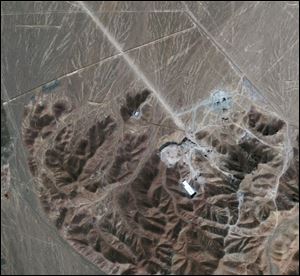
Iran starts nuclear site deep down
300 feet of rock shield facility against airstrikes
1/9/2012
In this Sept. 26, 2009 file satellite image provided by GeoEye shows a facility under construction inside a mountain located about 20 miles (32 kilometers) north northeast of Qom, Iran. Iran has begun uranium enrichment at a new underground site well protected from possible airstrikes, a leading hardline newspaper reported Sunday, Jan. 8, 2011.
TEHRAN -- Iran has begun uranium enrichment at a new underground site built to withstand possible airstrikes, an Iranian newspaper reported Sunday.
Iran has resisted Western pressure to rein in its nuclear program.
The daily newspaper Kayhan reported the operations at the bunker-like facility south of Tehran. They are small in comparison to Iran's main enrichment site. But the centrifuges at the underground labs are considered more efficient, and they are shielded from aerial surveillance and protected against airstrikes by up to 300 feet of mountain rock.
Uranium enrichment is at the core of the international standoff over Iran's nuclear program. The U.S. and its allies fear Iran could use its enrichment facilities to develop high-grade nuclear material for warheads.
Iran -- which claims it only seeks nuclear reactors for energy and research -- has increased threats and military posturing against stronger pressures. Those include U.S. sanctions that target Iran's Central Bank in order to complicate Iran's ability to sell oil.
A senior commander of the Revolutionary Guards force was quoted as saying Tehran's leadership has decided to order the closure of the Strait of Hormuz, a strategic oil route, if the country's petroleum exports are blocked.
"The supreme authorities ... have insisted that if enemies block the export of our oil, we won't allow a drop of oil to pass through the Strait of Hormuz. This is the strategy of the Islamic Republic in countering such threats," Revolutionary Guard deputy commander Ali Ashraf Nouri said. He was quoted by another daily newspaper, Khorasan.
Iran says its nuclear program is critical to its national security -- not because it is seeking weapons, but because it wants an alternative energy source to oil and is seeking to refuel a reactor that makes medical isotopes.
Four years of sanctions have hurt the Iranian economy, but have not changed its nuclear strategy. New U.S. sanctions aim to undercut the government by squeezing its most important source of revenue: oil sales. An oil embargo is under discussion in Europe.
In response, Iran has signaled that the sanctions have hardened its determination to proceed.
Iran threatened early last week to close off shipping in the Strait of Hormuz, an action that analysts say could send global oil prices soaring.
Iran conducted military exercises in the waterway, then said it would use force to bar any re-entry by the United States aircraft carrier John C. Stennis and its escort ships.
While U.S. officials and outside experts have dismissed the threat as hyperbole, and say they have every intention of patrolling the area with a carrier, there is broad concern that the Islamic Revolutionary Guards navy could harass oil tankers passing through the narrow strait or lay mines that could create significant risks to shipping.
The opening of the plant does not significantly affect estimates of how long it could take Iran to produce a nuclear weapon, if that is Iran's true intention.
The new facility has been inspected regularly, and unless the Iranians bar inspectors or manage to deceive them, any effort to produce uranium at bomb-grade levels would most likely be detected.
U.S. officials have estimated that they would have six months to a year to react, if needed, before the enrichment was completed.
Already Iran has produced enough fuel to manufacture about four weapons, but only if the fuel goes through further enrichment, nuclear experts say.
Israeli officials are most concerned with Iran's ability to enrich uranium from the new facility for use in weapons.
The Israelis were relieved in December when Defense Secretary Leon Panetta suggested the United States was determined not only to stop a weapon, but to prevent the ability to produce one.
But on Sunday, appearing on CBS' Face the Nation, Mr. Panetta was less specific about how close to the line Iran would be allowed to go.
Sanctions and separate embargoes against Iran were "working to put pressure on them, to make them understand that they cannot continue to do what they're doing," Mr. Panetta said.
"Are they trying to develop a nuclear weapon? No. But we know that they're trying to develop a nuclear capability. And that's what concerns us. And our red line to Iran is: Do not develop a nuclear weapon. That's a red line for us."